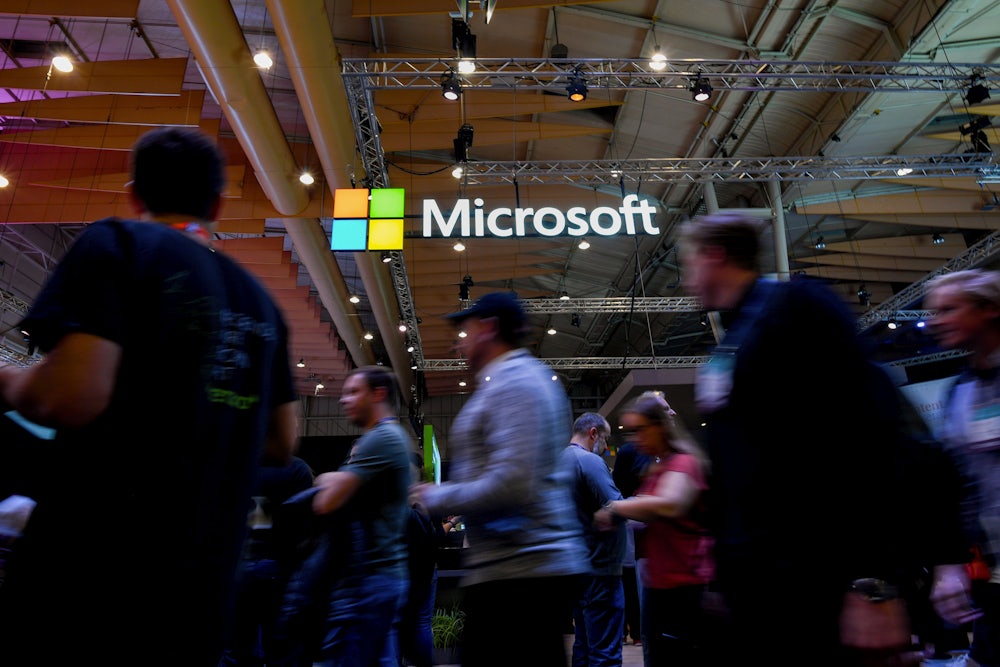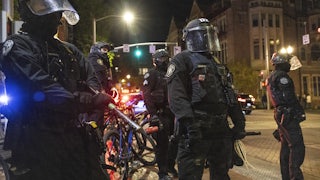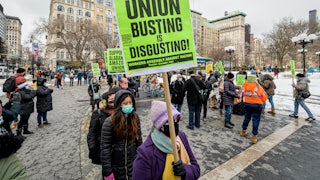There’s a growing unionization movement among tech workers, and most of their employers aren’t taking it well. That makes Microsoft’s agreement on Monday to stay neutral in a forthcoming organizing drive at Activision Blizzard, a gaming company it’s acquiring, an apparent breakthrough in an industry that’s become notoriously hostile to labor organizing.
Amazon routinely fires employees engaged in union organizing, and last month it fired more than half a dozen senior managers overseeing the Staten Island warehouse that unionized in April, presumably as a warning to other managers too weak-willed to nip organizing efforts in the bud. With the first-ever union election at a U.S. Apple store scheduled to begin Wednesday in Towson, Maryland, Apple hired the union-busting law firm Littler Mendelson to squelch similar organizing efforts elsewhere. It’s the same story at Google, where contract workers in its Google Fiber subsidiary in Kansas City, Missouri, in March became the first to unionize under Google’s Alphabet Workers Union. “We do not believe that it is in the best interest of our employees to unionize at this time,” the national operations manager for the contractor, BDS Connected Solutions, advised workers before the election.
Microsoft’s neutrality agreement with the Communications Workers of America strikes a very different note about workers organizing at Activision Blizzard, which makes World of Warcraft and Call of Duty. Microsoft announced in January its intention to acquire the company for $68.7 billion. If approved by the Federal Trade Commission (the merger is currently under review), it will be the biggest-ever deal in the history of video games. In March, Democratic Senators Elizabeth Warren, Bernie Sanders, Cory Booker, and Sheldon Whitehouse wrote FTC Chair Lina Kahn expressing worry that, among other things, Microsoft’s acquisition could interfere with a unionization drive at the company, which Activision Blizzard’s management opposed actively.
Microsoft itself, the Democratic senators noted, has a less-than-stellar record on labor organizing:
In 2014, 38 of Microsoft’s temporary workers in quality assurance successfully formed a union, only to see the company eliminate all of their jobs two years later.
Despite a filing with the [National Labor Relations Board] alleging that the “mass termination constituted illegal retaliation for union activism,” Microsoft was largely able to crush the unionization attempt and successfully retaliate against the organizers.
The new neutrality agreement is pretty clearly intended to address these worries and grease FTC approval. According to the CWA, Microsoft is promising to remain neutral about whether Activision Blizzard workers unionize. That means it won’t try to persuade workers to vote against CWA affiliation, for instance by holding mandatory “captive audience” meetings, in which employers try to convince employees to reject union representation. (NLRB general counsel Jennifer Abruzzo is trying, quite rightly, to get the NLRB to rule that such meetings violate the 1935 National Labor Relations Act, also known as the Wagner Act.) Microsoft is also promising to allow workers to “easily exercise their right to communicate with other employees and union representatives about union membership,” which sounds like it won’t try to bar organizers from using company email or leafleting on company property, provided the latter doesn’t disrupt business operations. This draws an especially stark contrast with Amazon, which earlier this month called the cops on a union organizer who was leafleting outside an Amazon warehouse in Kentucky but not, the police determined, on Amazon property.
Better still, Microsoft agreed to accept union affiliation by card check—the informal collection from workers of union authorization cards. The agreement says (per the CWA) that “employees will have access to an innovative technology-supported and streamlined process for choosing whether to join a union” that “can maintain confidentiality and privacy of that choice if they wish.” I couldn’t get a clear answer from Microsoft about what that meant. A CWA press representative later explained that it meant card check, with a twist. The union can avoid a cumbersome NLRB-supervised election by collecting paper (or digital) authorization cards. But if a given employee prefers to keep their vote confidential, they may submit “a confidential, electronic ballot” to be tallied by a third party and it will be included in the card-check count. It isn’t entirely clear to me how this will work.*
What’s clear is that Activision Blizzard pretty desperately needs a companywide labor union. California’s Department of Fair Employment and Housing sued the company last July, alleging that its “frat boy” culture occasioned textbook examples of sexual harassment: rape jokes, gropings, males delegating their work to female employees so they could play video games, etc. One female employee, the complaint said, committed suicide during a business trip with her male supervisor to which the supervisor brought butt plugs and lubricant.
Activision Blizzard disputed the claims, but a subsequent investigative report by The Wall Street Journal said that after the California lawsuit was filed, the company received “more than 500 reports from current and former employees alleging harassment, sexual assault, bullying, pay disparities and other issues” and that the company’s chief executive, Bobby Kotick, routinely ignored such complaints. The Journal piece cited a longtime female employee who said one Activision Blizzard party featured pole dancing by scantily clad women. Bad publicity from the California lawsuit and the Journal exposé pushed down Activision Blizzard’s stock, prompting Microsoft’s bid to acquire it.
Microsoft’s agreement with CWA doesn’t cover any employees outside Activision Blizzard. But the company’s president, Brad Smith, earlier this month issued a memo on unions that said, “We … do not believe that our employees or the company’s other stakeholders benefit by resisting lawful employee efforts to participate in protected activities, including forming or joining a union.”* Smith noted that he’d worked successfully with unions and works councils in Europe when he ran Microsoft’s corporate and legal affairs office there in the 1990s.
Smith’s memo sounded platitudinous, and was mostly ignored. The new agreement with CWA raises the intriguing possibility that he really meant it. We don’t know whether it will bear fruit, for Activision Blizzard or other Microsoft employees. But Microsoft’s approach on labor organizing couldn’t be more different from that of other tech companies.
It’s also strikingly different from the corporate culture that prevailed when I was a Microsoft employee for five years in the early 2000s. (Microsoft owned Slate magazine, where I worked; in 2005 it sold Slate to the Washington Post Company.) In those days, Microsoft rented out sports arenas to host testosterone-fueled rallies where employees were obliged to cheer Bill Gates and Steve Ballmer as if they were NFL stars. I never attended one because I was in Slate’s Washington bureau, but Redmond, Washington–based colleagues rolled their eyes and compared these events to Nuremberg rallies. Now Microsoft is redirecting those cheers—two of them, anyway—toward worker empowerment. Let’s hope they really mean it.
* This article originally misstated the date of the memo and misstated that this process doesn’t include a card check.






